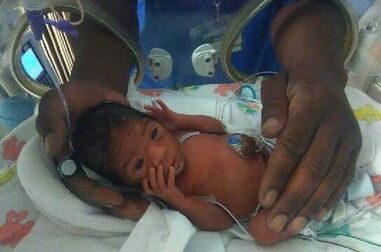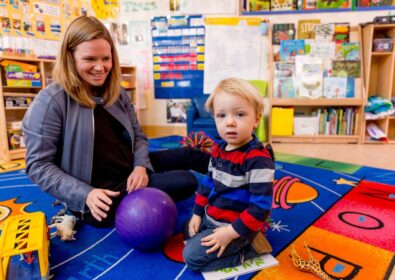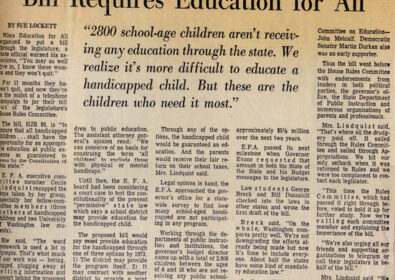It’s Hard to Imagine a More Challenging Beginning. Or a More Promising Future.
It was the summer of 2017. She was five months pregnant. When the weather turned extremely hot, it aggravated her asthma.
“The air quality was bad,” Juana (pronounced JAAN-uh) says. “I kept going back and forth to the hospital saying I couldn’t breathe.”
Once in a hospital room, Juana went into cardiac arrest. To save both Juana and her baby, doctors placed her into a medically induced coma and delivered Terrance via C-section at just 26 weeks.
“He was a micro preemie,” Juana says. “He was in the NICU for three months.”
A few weeks after Terrance came home to his mom and older sister, a public health nurse noticed he was behind on some milestones. She recommended Early Supports services from Northwest Center Kids.
“I knew of Northwest Center because I have a cousin who has Down syndrome and he worked with them,” Juana says. “My aunt completely recommended Northwest Center. But I didn’t know anything going into this about what occupational therapy was or what Terrance needed.”
The Northwest Center Kids Early Supports (Kids ES) team quickly put her at ease.
“They came to my home,” she says. “We did an initial consultation with Melinda [Bourgette, a family resources coordinator].
Then the occupational therapist and the physical therapist assessed Terrance individually, and he qualified for weekly visits.”
The family-centered, home-based approach worked well for Juana and Terrance.“They make it very easy,” she says. “There was a speech therapist, a nutritionist and an occupational therapist to make sure he was eating, and a physical therapist for him to learn how to sit up, then stand, and then walk.”

The team was also able to provide items for the family like a high chair so Terrance, who had spent his first weeks using a feeding tube, could practice sitting and feeding himself; and orthotics to help him walk, decorated with airplanes and fire trucks.
As Terrance progressed, his services changed to work toward the family’s new goals and focus. “He started eating regularly, so we didn’t need the occupational therapy anymore,” Juana says. “He started walking and running normally, so we didn’t need the orthotics anymore.”

Speech therapy continued, and things were going well. But then COVID-19 brought new challenges for Juana. “After having the heart attack, my immune system wasn’t so great,” she says. “My asthma still wasn’t under control. I was worried about catching Coronavirus. Plus I was on this heavy medication that made me gain weight, so I wasn’t able to do much.”
To keep families safe, the Early Supports program quickly pivoted to teletherapy. Like most people at the time, Juana had never heard of Zoom, so the team supported her as she navigated the new system, then came up with creative ways to connect in a safe, socially distanced way.
“Our first Zoom meeting had the occupational therapist, physical therapist, speech therapist, and [family resources coordinator] Melinda so we could do our yearly review,” Juana remembers. “They said, ‘If you need anything, just let us know, and we’ll be able to drop it off.’”
And they were true to their word.
“I needed help with everything, basically, during the pandemic,” says Juana. “When I needed a stroller, Melinda said, ‘Of course,’ and she brought me the stroller that we use to this day. It was a brand-new stroller! If I needed diapers, she was right there. And then she would bring me extra things. She would say, ‘Hey, I brought some wipes and I brought some masks.’ Toothpaste and toothbrush, diaper cream clothing and shoes for him, so I wouldn’t have to go out and get those things.”
Then, in April 2020, a new worry: Terrance, now two-and-a-half years old, had stopped talking and had become more withdrawn. The Kids ES team referred Terrance to Seattle Children’s Hospital for a virtual evaluation. He was diagnosed with Autism Spectrum Disorder (ASD).
The first thing the Kids ES team did was make sure Juana was okay. (“They said, ‘How are you feeling? Do you need more support?’” she says.) Then they once again adjusted their services to address Terrance’s new needs.
They reassured Juana: “’Now we know, and now we can move forward,’ they said.”
But the stress began to take its toll.
 |
With Terrance approaching three years old, Juana needed to prepare to transfer him to a pre-K program. (Early Supports services are for children from birth to age 3, which is a critical time in a child’s development.) Juana was working with her team to plan for Terrance’s transition to a new program, but the paperwork was overwhelming—especially because she had no printer or fax machine, and normal resources like the library were closed in the pandemic.
“I had to register him for SSI [Social Security benefits],” she remembers. “I had to register him for school. I needed to mail certain things. I needed to copy certain things, do paperwork, and they wanted me to fax it over.”
|
Then Terrance began hurting himself.
“He was scratching himself—his legs, his stomach, his arms,” Juana says. “It was starting to worry me a lot; I didn’t want him to use that as some kind of coping mechanism. It was leaving a ton of open wounds and scars.”
Juana was so overwhelmed that when she tried to ask her team for suggestions, she burst into tears.
“It wasn’t just over him scratching himself. It was about the pandemic. It was about the Black Lives Matter marches—I have a Black son. I was just so scared of life in general. There were so many things to be worried about at that time, and then him being diagnosed with autism and scratching himself. I just broke down.”
Ready for the Future
Northwest Center Kids Early Supports responded with new strategies and even more support—for both mother and son.
Weighted blankets helped Terrance feel more secure.
Juana set up a daily schedule for Terrance, similar to one he would follow when he starts school, so he’d get used to a new routine. She was skeptical, “But it worked!” she says.
Because Juana liked singing to Terrance, they encouraged her to sing to help calm him. “They suggested all these songs I already know,” Juana says. “I hadn’t even thought of that. That has actually been the most helpful by far.”
The team made sure to check on Juana, too. “Melinda would send me things to my phone like a happy birthday GIF. She would let me know that everybody’s thinking about me.”
And, when the holidays approached, Kids ES came through for the family again. When Juana was unable to buy gifts or find other assistance, “I called up Melinda a week and a half before Christmas,” she says. “She literally showed up with a shopping cart full of gifts for both of my kids.”

Even more important, “Now I’m confident moving to the next stage,” she says, “and I know that Terrance is more confident in himself. Everything that we’ve done with Northwest Center, I’ve been included. And it wasn’t even about Terrance having a disability; it was about him as an individual. In the end, they were able to give me tools so I can run the household better and take care of Terrance a lot better, especially with autism.
“I understand that he will be in therapy for a long time,” Juana says, “but it’s just his journey. He’s the sweetest, funniest little kid. I just want him to live a happy life.”



